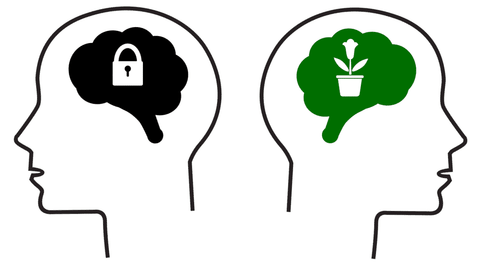“A mind is like a parachute. It doesn’t work if it is not open.”
Frank Zappa
A short story. . .
Many years ago two salesmen were sent by a British shoe manufacturer to Africa to investigate and report back on market potential.
The first salesman reported back, “There is no potential here, nobody wears shoes.”
The second salesman reported back, “There is massive potential here, nobody wears shoes!”

Growth Mindset vs. Fixed Mindset
What would you say if I told you that you are your mindset?
That you are the way you think, the way you mentally and emotionally respond to situations, and you are how you judge yourself.
Each of our lives is filled with “events.” Events are merely things that happen. Circumstances and situations that surround our unique existence in this life.
Where and how we show up in response to the events happening in each of our lives is what defines us – is who we are.
Mindset is a term that connotes our established set of attitudes in response to events. It refers to precisely how we mentally respond to what happens in our lives.
The Origin of Growth vs. Fixed Mindsets
In 1988, research was conducted by Carol Dweck on students’ behavior and attitude in response to “failure.”
What Dweck found is that when individuals believe in the possibility of getting smarter rather than their intelligence being static, they understand that effort leads to growth, which facilitates working harder.
“In a fixed mindset students believe their basic abilities, their intelligence, their talents, are just fixed traits. They have a certain amount and that’s that, and then their goal becomes to look smart all the time and never look dumb. In a growth mindset students understand that their talents and abilities can be developed through effort, good teaching and persistence. They don’t necessarily think everyone’s the same or anyone can be Einstein, but they believe everyone can get smarter if they work at it.”
—Carol Dweck, Stanford University
In effect, Dweck’s research proved that an individual’s mindset sets the stage for performance and achievement.
Where an individual exhibits a “fixed mindset,” they generally hold the belief that who they are in this very moment (at least in terms of certain basic qualities) is who they will be for the long haul. The belief that the qualities and characteristics one attributes to oneself are, well, fixed.
*Phrases that illustrate a fixed mindset *are any statements about oneself that imply a stability of characteristics.
Statements about oneself that start with “I am…I am not…I only like…I don’t like…I am unable…I am only able to…”
A “growth mindset” is an established attitude with which a person believes that his or her capabilities are susceptible to change and growth.
The belief that a person’s qualities are not static, and that with effort and dedication, a person can actually develop the ability to do almost anything.
To be almost any way.
Phrases that illustrate a growth mindset imply a possibility of change in the relationship between an individual and a given quality.
Statements like, “I haven’t developed the skill yet… I’m working on it…I’ve previously had a hard time doing…That hasn’t worked for me before, but maybe a different approach will…”
What’s important to realize is that the mindsets don’t only refer to certain “capabilities,” but also to typical responses to situations.
It’s the difference between thinking, “I just get really angry when someone cuts me off while driving” vs. “My road rage is a problem, I need to work on it.”

Mindsets are Self-Reinforcing
What’s incredible about the concept of a mindset is that regardless of whether someone generally hold a fixed or growth mindset, it acts as a self-fulfilling prophecy.
Where one exhibits a fixed mindset, their view about their own faculties as static leads to corresponding actions based on that view.
As such, a fixed mindset leads to action or inaction that leaves little to no room for growth.
A person who simply believes that “they’re not good at public speaking” won’t endeavor to master the event of speaking in front of a crowd.
Rather they’ll either consistently avoid the task, or dread anytime it is forced upon them with the quality of their output matching their self-limiting belief.
Why?
Because people who hold “fixed mindsets” want to hide their flaws so as to avoid negative judgment and criticism.
We stick with what we know to protect ourselves from devastation and maintain some sense of confidence. In a fixed mindset, fear of failure defines the quality of our actions.
Similarly, where one believes that the quality of their characteristics is subject to positive change, their actions correspond to the belief.
To use the same example of public speaking, a growth mindset would lead to motivation and practice of speaking in front of groups with an eye towards improving, which would ultimately result in gaining relative mastery over the skill.
Why?
Because in a growth mindset, the fear of failure is less daunting than with a fixed mindset. Where qualities aren’t fixed, one strives to adapt, learn and grow. Confidence isn’t fostered by the judgment of others but rather is the result of continued effort in spite of previous difficulty.
It’s more about the process than the outcome of a given action.
The Relationship Between Mindset & Habits
Without believing in the possibility of change, nobody in their right mind would struggle to adjust or improve their habits.
We take for granted just how powerful our minds are.
The stories we tell ourselves about who we are and who we have the potential (or lack thereof) to be can either help guide us to new-found skill and confidence, or keep us exactly where (and who) we are in this moment.
The intricate relationship between what we think about ourselves and how we take action in our lives is the most important relationship we have.
If we fail to cultivate the relationship between what we think about ourselves and the things we do in life, we’re essentially writing off growth as a possibility.
We all have ways in which we want to change for the better. Habits we want to adjust and qualities we want to improve.
The first step towards creating that positive change is to set the proper foundation for the way you think about your capabilities.
